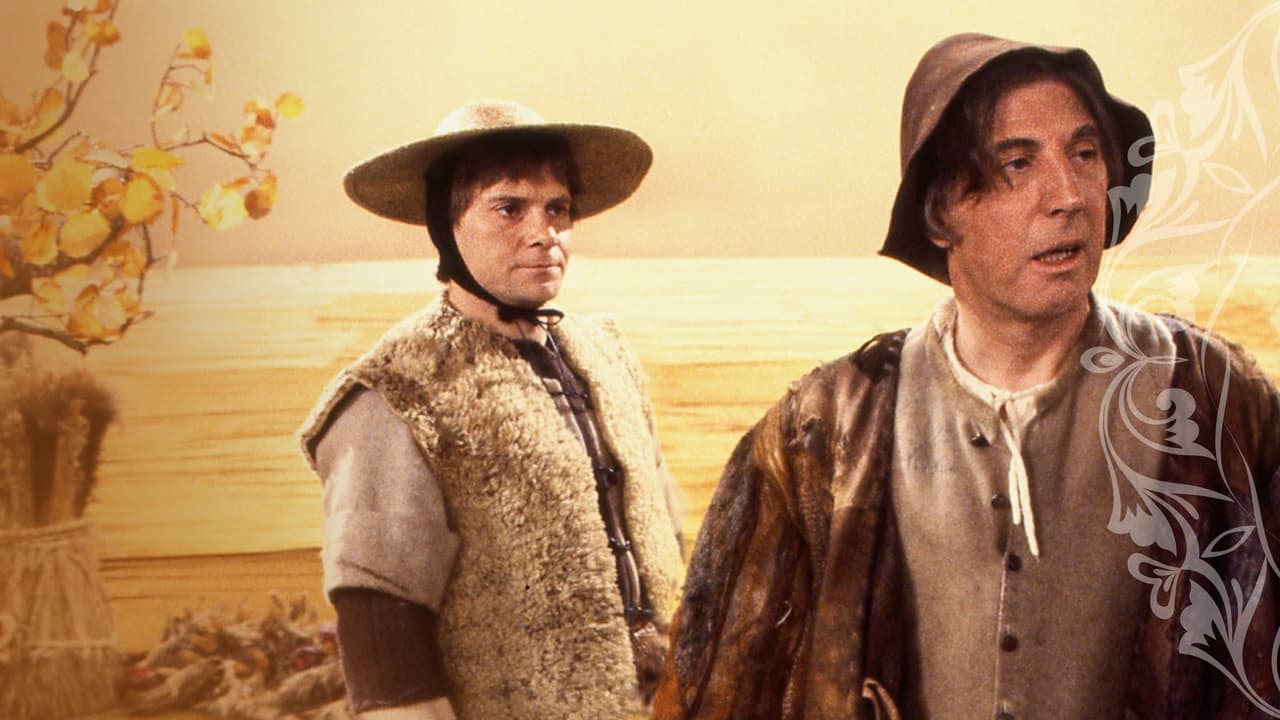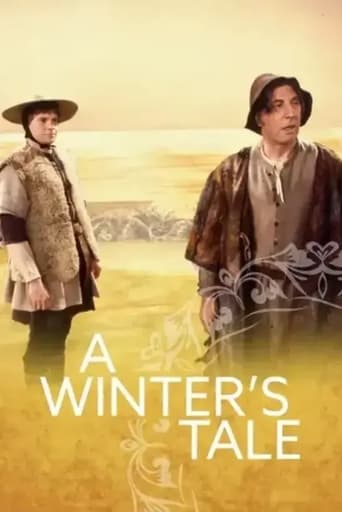


You won't be disappointed!
... View MoreSadly Over-hyped
... View Morebrilliant actors, brilliant editing
... View MoreThe movie really just wants to entertain people.
... View MoreThough this production is not without some minor flaws, it is overall a sparkling version of a magnificent play. In particular, the director Jane Howell recognizes that the sumptuous language of the play is its foremost virtue, and she assigns top priority to the recitation of that language.The director is helped by superb acting from virtually every performer who appears. On the one hand, there are a few blemishes in the performance by Jeremy Kemp. For example, he rather awkwardly clutches his son while he is delivering the crucial "Affection" soliloquy, and he does not adequately convey a sense of desolation after the deaths of his son and wife have been announced to him in Act III. However, the few shortcomings in his performance are greatly surpassed by its overall excellence.Most of the other performances are flawless or nearly so. Margaret Tyzack is the very embodiment of speaking truth to power in her role as Paulina; David Burke (who is married to Anna Calder-Marshall, who impeccably plays Hermione) is convincing at every stage as Camillo; Cyril Luckham is a highly entertaining Antigonus; Robert Stephens is fine in the quite difficult role of Polixenes (difficult because Polixenes in much of the second half is as heavy-handedly oppressive as Leontes in the first half, albeit for different reasons); Paul Jesson and Arthur Hewlett are amusing as the rustic father and son; Rikki Fulton is an engaging Autolycus; and the sundry other members of the cast likewise carry out their roles admirably.The passage of sixteen years is not handled especially well, as only a few characters (Camillo, Hermione, Cleomines, Dion) look any older in the second half of the play than in the first half. The notorious difficulty of the exit of Antigonus pursued by a bear is likewise not handled particularly well, as the bear looks preposterously phony. (If that bit of the play were unequivocally comical, the phoniness of the bear would be unexceptionable. However, the pursuit of Antigonus is an event that leads to his gory death even though it also offers material for some entertaining remarks by Paul Jesson's character.) Still, the minor defects in this production detract only very slightly from its magic. I heartily recommend it to anyone who loves Shakespeare's awe-inspiring language and to anyone who admires fine acting.
... View MoreA fascinating play in which Shakespeare follows a simple pattern of his but multiplies the variations on that pattern. Two king brothers Leontes and Polixemes get into some row about Leontes' wife who is accused by Leontes to be an unfaithful adulteress with his brother. That accusation causes a severe punishment from the Gods: their son Mamilius dies, and then his wife Hermione dies but he had banned the daughter she had gotten then, mind you from him is spite of his accusations, and sent one of the four (mark that number) noblemen of his court, Antigonus, to expose her to wild beasts but in fact Antigonus is killed by a bear and the daughter called then Perdita is retrieved from the wild by a shepherd. Antigonus was the husband of the midwife who delivered the daughter of the Queen. Leontes had also sent a second of his noblemen after his brother Polixemes to poison him, which that nobleman Camillo will not do and he will shift allegiances.We jump then from Sicilia, Leontes' kingdom, to Bohemia, Polixemes' kingdom and the shepherds there, "sixteen summers" later, of course will I say: 4 is good, 8=4x2 is perfect so you can imagine what 16=4x4=8x2 can be: heaven. And heaven it is. Polixemes' son Florizel is courting the shepherdess Perdita. The father, Polixemes, and his adviser, Camillo, under disguise, find out. Camillo will play the double agent in the two directions: securing a diplomatic mission to Florizel from his father in Sicilia and Perdita could go along and they could be married in Sicilia, and at the same time the Shepherd who raised Perdita manages to bring to Polixemes the evidence of the royal origin of Perdita and then Camillo and Polixemes plus the Old shepherd and his son just known as the clown follow suit and arrive in Sicilia just after the two young people.All that is so well done that the suspense is always perfect and strong, though we know what is going to happen. That's Shakespeare's art: he knew how to sustain suspense till the last minute.And he can finish with the correction of the evil imposed by Leontes a long time ago, it is true with a little bit of magic that will revive Hermione, the Queen, from her stone statuesque avatar, or likeness.The main people who are reunited are Leontes, Polixemes, Hermione, Perdita, Florizel, hence five people, a satanic pentacle. But six couples are also reunited balancing thus the pentacle with a symbol of Solomon's wisdom: Leontes and his brother Polixemes, Leontes and his Queen Hermione, Hermione and her daughter Perdita, Leontes and his daughter Perdita, Perdita and Florizel, and finally Florizel the run away son and his father Polixemes.But he adds to these six couples two more to reach eight and hence the reunion of sixteen people, two by two, with the nobleman Camillo and the nurse and midwife Paulina, and the Old Shepherd and his son the Clown who are the beneficiaries of the generosity of the two kings, and the son is made noble on the same occasion. And we reach there the absolute perfection of 16, heaven on earth.What are the tragic and dramatic elements Shakespeare purifies: the two brothers (Hamlet), the poison between them, the distribution of flowers by Perdita (Ophelia), the exposed baby (a Greek and Germanic classic), the false accusation against a wife (many instances), the rebellious son and his elopement (Hamlet, Romeo and Juliet, and so many others) the jealousy of a husband (Othello and Desdemona), the lost child finally re-found (the Tempest, Twelfth Night, and a few others) and of course the elimination of all the participants in the disturbance of the balance of time that are here most of them revived, re-found and reunited.The peddler selling ballads is not typically Shakespearian though we may think of Romeo and Juliet and the minstrel in the dance but in the same period, one or two years later, Ben Jonson will use the same trick in Bartholomew Fair. So what makes Shakespeare and this production of The Winter's tale different? The rhythm which is very intense and the outside setting which is always the same except for the color, painting, decoration and it is very geometrical with one alley between two triangular blocks. Yet Perdita who looks nearly her age, 16, seems younger than Florizel who should be the same age. But that is a slight detail. I guess it is not easy to get teenage actors who can fill up these roles.This constantly broken pattern, rejuvenated by some variation, and yet always present behind makes this play stand out.Dr Jacques COULARDEAU, University Paris 1 Pantheon Sorbonne, University Paris 8 Saint Denis, University Paris 12 Créteil, CEGID
... View MoreThis excellent Shakespearean comedy is given a good production here with the BBC. Excellent performances combined with some great direction make this one of the more watchable of the BBC productions.King Leontes of Sicily (Jeremy Kemp) suspects his wife Hermione (Anna Calder-Marshall) of cheating on him with his friend King of Bohemia Polixenes (Robert Stephens) and sets in motion a tragic train of events leading to an improbable but welcome resolution...Jeremy Kemp is excellent as Leontes, and Margaret Tyzack is on fine form as Hermione's friend Paulina. Debbie Farrington plays Perdita, Leontes grown-up daughter and she is well matched with Robin Kermode who plays Floriziel. David Burke is solid as Camillo, and it's interesting to see Scottish actor Rikki Fulton as amiable rogue Autolycus.It's not all good - the bear special effect nearly produced laughter in me and the time span of the story is not played well at all - Camillo is the only who appears to age at all.Still, it's good fun and well-paced despite it's three hour running time.Good stuff.
... View More"The Winter's Tale" is one of the late romances, in which an improbable plot is overcome by authorial magic. Unlikely people go through even more unlikely ordeals and separations, only to be united in healing reconciliation in the last scene. The test is, do you get the shivers down the back when fractured people are made whole again at the end? Here the answer is yes.Director Jane Howell uses a unit set which is unobtrusively effective all the way through. The visuals are in monochromatic white at first, then as the story progresses color is added in increasingly vivid tones. The actors often address themselves directly to the camera in tight closeup, so if you have a large-screen TV, you'll get to know these people real well.Pace is generally good, though we do bog down with the sheep-shearing festival of rustics at the beginning of the second half. Shakespeare's clowns are often annoying, but they can clear the air. I just don't like slowing down for them.Jeremy Kemp is excellent as the angry, paranoid King of the opening scenes. He glares into the camera lens and hisses his lines as the great screen villain he was. However, after the Oracle of Delphi pronounces his suspicions false and his wife innocent, Kemp never finds a way to physicalize his response and emotional transformation. You have to listen carefully to his well-recited lines, because you can't guess from his body what his reactions are.Robert Stephens as Polixenes looks blurry and very much the worse for wear, but gives a detailed and professional performance nonetheless. Margaret Tyzack is formidable as Pauline. It's scandalous that this is her only appearance in the series. Anna Calder-Marshall, Debbie Farrington and David Burke are all superior, and Jeremy Dimmick is probably the best young boy in the whole cycle.The rest of the cast is mostly fine, and many of them pop up again in Jane Howell's "Henry VI" trilogy plus "Richard III," and the "Titus Andronicus." This version of "The Winter's Tale" is good stuff, so don't hesitate.
... View More